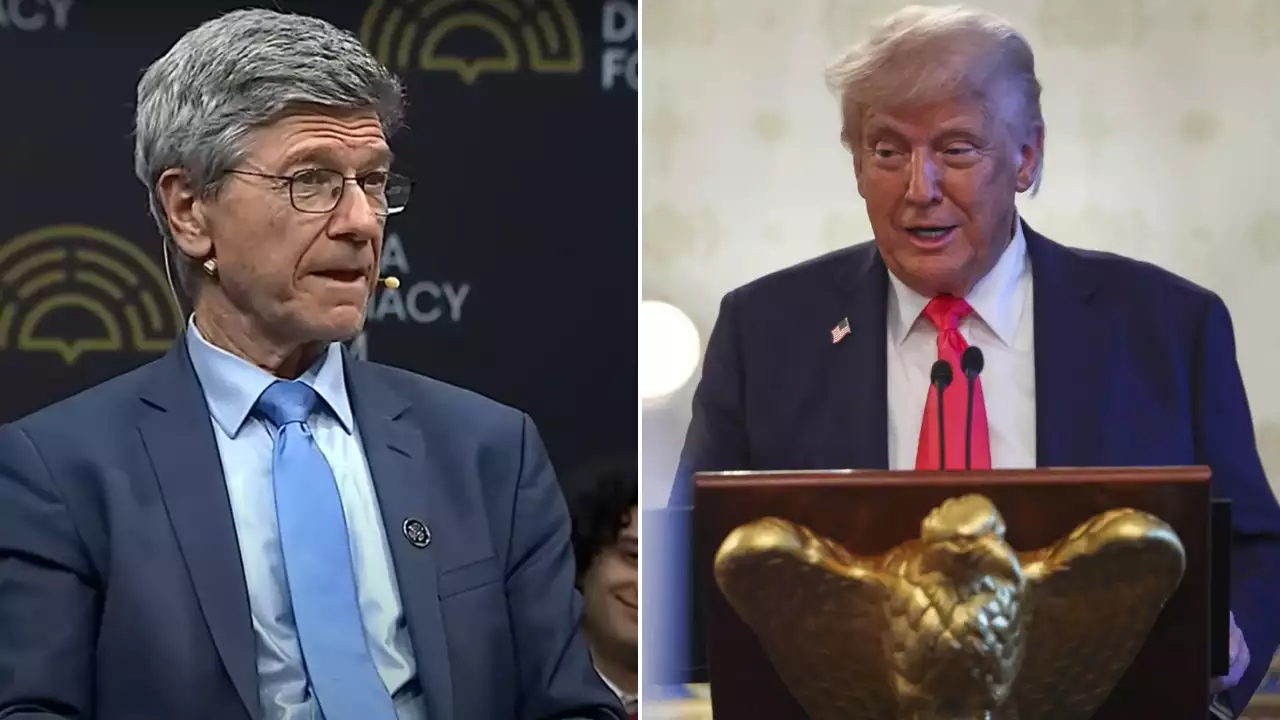Economist Jeffrey Sachs Critiques Business Strategies, Compares to ‘Mickey Mouse’

Renowned economist Jeffrey Sachs has sharply criticized former President Donald Trump’s tariff policies, labeling them as “delusional” and suggesting that even a character like Mickey Mouse would understand trade better. Sachs condemned Trump’s focus on trade deficits as “childish and dangerous,” attributing a staggering $10 trillion loss in global wealth to the former president’s economic strategies. He warned that the U.S. is moving toward authoritarianism, characterized by “one-man rule by emergency decree.”
Sachs’ Critique of Trump’s Trade Understanding
During a public forum, Sachs did not hold back in his assessment of Trump’s grasp of trade economics. He stated that Trump’s understanding is so flawed that he would fail a basic economics class. Sachs specifically criticized Trump’s fixation on trade deficits, arguing that it oversimplifies complex economic issues. He recounted an instance where Trump claimed that Lesotho was “cheating” the U.S. because it exported more to the U.S. than it imported. Sachs emphasized the absurdity of this claim, stating, “It’s completely delusional.” He pointed out that Trump’s administration created a formula to impose tariffs based solely on trade imbalances, which Sachs deemed nonsensical and indicative of a lack of economic understanding.
Sachs further elaborated on the consequences of such misguided policies, suggesting that they lead to tariffs that are calculated without a sound economic basis. He expressed disbelief at the approach taken by the U.S. Trade Representative’s office, which he described as a “stupid formula” that would not be accepted in a basic economics course. This critique underscores the broader implications of Trump’s trade policies, which Sachs believes are detrimental to both the U.S. economy and its global standing.
The Real Issues Behind Job Losses
Sachs also addressed the narrative that blames foreign countries for the loss of manufacturing jobs in the U.S., particularly in the Midwest. He argued that automation, rather than trade, is the primary driver of job losses in industries like automotive manufacturing. “If you go to an automotive plant, it’s all robots,” he explained, emphasizing that the shift towards automation is a significant factor in the changing job landscape. This perspective challenges the simplistic view that outsourcing is the sole reason for job losses, highlighting the need for a more nuanced understanding of economic changes.
Moreover, Sachs criticized Trump’s rhetoric, which he believes misleads voters in swing states by attributing economic woes to countries like China and Mexico. He accused Trump of providing a “pseudo explanation” for economic discontent, which he claims distracts from the real issues at play. By framing the narrative in this way, Sachs argues that Trump is failing to address the underlying economic challenges facing American workers.
Concerns Over Environmental Policies
In addition to his critique of trade policies, Sachs expressed alarm over Trump’s environmental decisions, particularly the withdrawal from the Paris Climate Agreement and the promotion of coal. He described Trump’s recent executive order to revive the coal industry as “willful destruction of wellbeing.” Sachs warned that such actions could have dire consequences for both the environment and public health. He urged the global community to avoid entering what he termed “crazy land,” a reference to the irrationality he perceives in current U.S. policies.
Sachs’ concerns extend beyond trade and job losses; he emphasizes the importance of addressing climate change and promoting sustainable practices. His remarks reflect a growing apprehension among economists and environmentalists about the long-term implications of Trump’s policies on both the economy and the planet.
The Economic Reality of Tariffs
While Trump has touted tariffs as a powerful economic tool, claiming they generate significant revenue, Sachs pointed out a stark contrast between the president’s assertions and the actual figures. Trump recently claimed that the U.S. was making “a fortune with tariffs,” estimating earnings of $2 billion a day. However, according to U.S. Customs and Border Protection, the actual revenue collected from customs duties is just over $260 million per day. This discrepancy raises questions about the effectiveness and impact of Trump’s tariff policies.
Sachs’ critique highlights the broader economic implications of these tariffs, suggesting that they may not provide the benefits that Trump claims. As the debate over trade and economic policy continues, Sachs’ insights serve as a reminder of the complexities involved in understanding global trade dynamics and their effects on the U.S. economy.
Observer Voice is the one stop site for National, International news, Sports, Editor’s Choice, Art/culture contents, Quotes and much more. We also cover historical contents. Historical contents includes World History, Indian History, and what happened today. The website also covers Entertainment across the India and World.
Follow Us on Twitter, Instagram, Facebook, & LinkedIn

